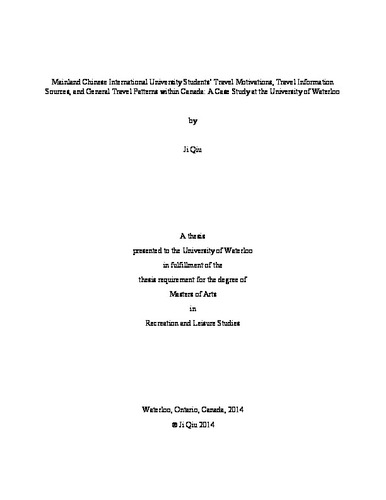Mainland Chinese International University Students’ Travel Motivations, Travel Information Sources, and General Travel Patterns within Canada: A Case Study at the University of Waterloo
Abstract
Many international students conduct tourism activities in the host country during their overseas living experience, which is significant for the country’s tourism industry and overall economy. Chinese international students (CIS) increasingly dominate the international education sector, and they generate tourism in the host country. In the context of Canada, while the number of CIS is significant, there is a lack of understanding about CIS’s intra-Canada travel characteristics. Regarding international student travel, while motivations have been widely studied, tourism information-search behavior is not well understood. The purpose of this study is to develop a profile of a Canadian domestic travel market segment -- CIS, by exploring their intra-Canada overnight leisure travel, regarding general travel patterns, travel motivations, travel information sources, and socio-demographic characteristics. To achieve this purpose, this study explored this population in Canada through a case study at the University of Waterloo (UW). This study developed a four-section self-administered survey based on the literature. The survey was distributed online using SurveyMonkey. Potential participants were approached through various channels: UW departments, an undergraduate class, personal resources, and UW Chinese Student and Scholar Association website. In total, 154 responses were used for data analysis.
It was found that CIS in Canada exhibited similar general travel patterns compared to CIS in other nations. Using Principal Components Analysis, four motivational dimensions of intra-Canada overnight leisure travel emerged: “Exploration and Learning”, “Memorable Activities and Achievement”, “Socialization and Prestige”, and “Escape and Relaxation”. Regarding travel information sources, the study findings generally echo findings from the very few previous studies about international students’ travel information sources; however, some new and different findings emerged. Overall, online information sources are more important than offline information sources, which indicates the importance of internet. Friends and relatives’ recommendations, previous visit experiences, destination marketing organizations websites, and general blogs or online travel communities are important information sources, while professional travel consultants, offline tourism specific literature, and traditional mass media are of low importance. Significant correlations were found between the four travel motivational dimensions and the two types of information sources (online and offline). The findings of this exploratory study have practical implications for both tourism marketing and international education promotion of Canada towards CIS.
Collections
Cite this version of the work
Ji Qiu
(2014).
Mainland Chinese International University Students’ Travel Motivations, Travel Information Sources, and General Travel Patterns within Canada: A Case Study at the University of Waterloo. UWSpace.
http://hdl.handle.net/10012/8704
Other formats
Related items
Showing items related by title, author, creator and subject.
-
Application of Crowdsourced Travel Data in Identifying Potential Opportunities for Transportation Demand Management
Chiu, Ying Hay (University of Waterloo, 2017-12-19)Traffic congestion is a major concern that many urban regions contend with. Since the 1970s, transport practitioners have sought out different ways to alleviate the negative impacts of congestion. The concept of Transportation ... -
Transformational Tourism: The Example of Backpackers in Tibet
Zhou, Sishi (University of Waterloo, 2014-09-25)Hannam (2009) stated that travel played an important role in helping people, especially young people, to develop their inner self. Experiences, relationships and memories continue to influence ongoing journeys, including ... -
Baby Boomers’ and Seniors’ Domestic Travel Motivations: An Examination of Citizens in Tainan, Taiwan
Chen, Hui Wen Joyce (University of Waterloo, 2009-01-19)The literature on the travel market has focused on the motivations and activities of different market segments, destination attributes, evaluation of well-being, travel behaviour and characteristics, and demographic ...

